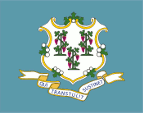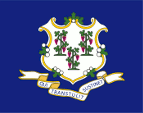Connecticut |
|
|
|
| Übersicht – Contents: | |
Diese Seite ist Teil des Projektes
Connecticut |
|
|
|
| Übersicht – Contents: | |
Flagge – Flag: |
|
 |
seit/since 1897, Landes- und Staatsflagge – civil and state flag, Seitenverhältnis – ratio 3:4, Quelle/Source, nach/by: Flags of the World, 50states.com, Corel Draw 4   |
 |
Variante in Dunkelbau – dark blue version, Landes- und Staatsflagge – civil and state flag, Seitenverhältnis – ratio 3:4, Quelle/Source, nach/by: Wikipedia (EN), Corel Draw 4   |
| Die Flagge von Connecticut wurde in der heutigen Form im Jahre 1897 angenommen. Sie zeigt ein azurblaues Feld (so steht es im Gesetz, jedoch gibt es heute auch Varianten in Royalblau) mit einem üppig gestalteten weißen Wappen in der Mitte. Es stammt aus dem Jahre 1711 und zeigt einen weißen Wappenschild und darauf drei Weinstöcke mit je drei Bündeln roter Weintrauben. Diese stehen für die drei Kolonien: New Haven, Old Saybrook und Hartford. Unterhalb des Wappens, in einem golden umrandeten Band das Staatsmotto: "Qui Transtulit Sustinet" → "Er, der verpflanzt hat, erhält". Das bezieht sich auf die erfolgreiche Besiedlung durch Engländer ab dem Jahr 1630, die man sich als das Anpflanzen und Ausbreiten von Wein vorstellte. Die Trauben repräsentieren Glück, Glückseligkeit und Frieden und die Weinreben stehen für starke und dauerhafte Freundschaften. |
The flag of Connecticut
was adopted in its present form in 1897. It shows an azure blue field (that's
what the law says, but today there are also variants in royal blue) with a lavishly designed white coat
of arms in the centre. It dates back to 1711 and shows a white shield with
three vines, each with three bunches of red grapes. These represent
the three colonies: New Haven, Old Saybrook and Hartford. Below the coat of
arms, in a gold-framed band, is the state motto: "Qui Transtulit Sustinet" →
"He, who transplanted, sustains". This refers to the successful colonisation
by the English from 1630 onwards, which was imagined as the planting and
spreading of grapes. The grapes represent happiness, bliss and peace and the vines symbolise strong and lasting friendships. |
| Quelle/Source: 50states.com, Wikipedia (EN), Flags of the World, Volker Preuß | |
|
Landkarte der Bundesstaaten der USA – Map of the federal states of the USA: interaktiv – clickable |
|
|
Landkarte des Landes – Map of the Country:
Größere Karte anzeigen – View larger map Keine Karte? No map? → |
| Zahlen und Fakten – Numbers and Facts: | |
|
|
|
|
|
|
|
|
|
|
|
|
|
|
|
|
|
ca. 7000 v.Chr.
· Besiedlung durch Indianer (Algonkin) 1614 · der Niederländer Adriaen Block erforscht das heutige Connecticut 1630 · die Plymouthkompanie schenkt das heutige Connecticut dem Grafen von Warwick 1631 · der Graf von Warwick schenkt das heutige Connecticut zwölf englischen Adligen 1633 · Beginn der Kolonisierung durch englische Siedler 1634 · Gründung von New Haven 1635 · Gründung der Siedlungen Windsor und Wethersfield 1636 · Gründung der Siedlung Hartford 14.01.1639 · Gründung der Kolonie Hartfort (Hartfort, Windsor und Wethersfield) 05.12.1644 · die Kolonie Saybrook wird an die Kolonie Hartfort angeschlossen 23.04.1662 · der englische König Karl II. vereinigt die Kolonien Hartfort und New Haven zur Kolonie Connecticut, erste Verfassung 05.01.1665 · New Haven erkennt die Vereinigung mit Hartfort an 1687–1689 · Connecticut ist Teil des Dominions Neuengland 1775–1782 · Unabhängigkeitskrieg gegen Großbritannien, viele Städte, besonders Danbury und New London, erleiden starke Zerstörungen 07.07.1776 · Connecticut erklärt seine Unabhängigkeit von Großbritannien 01.09.1788 · Connecticut wird der 5. Bundesstaat der USA 1818 · zweite Verfassung 1848 · Abschaffung der Sklaverei 1861–1865 · Bürgerkrieg: Connecticut vertritt energisch die Sache der Union (USA) |
|
about 7000 B.C.
· settlement by Indians (Algonquin) 1614 · the Dutchman Adriaen Block explores the today's Connecticut 1630 · the Plymouth Company gives today's Connecticut to the Earl of Warwick 1631 · the Earl of Warwick gives today's Connecticut to twelve English nobleman 1633 · beginning of the colonization by British settlers 1634 · founding of New Haven 1635 · founding of the settlements, Windsor and Wethersfield 1636 · founding of the settlement Hartford 14th of January 1639 · founding of the Colony of Hartford (Hartford, Windsor and Wethersfield) 5th of December 1644 · the Saybrook Colony becomes incorporated to the Colony of Hartford 23rd of April 1662 · the English King Charles II. unites the colonies of Hartford and New Haven to the Colony of Connecticut, first constitution 5th of January 1665 · New Haven recognizes the union with Hartford 1687–1689 · Connecticut is part of the Dominion of New England 1775–1782 · independence war against Britain, many cities, especially Danbury and New London have to suffer heavy damages 7th of July 1776 · Connecticut declares its independence from Britain 1st of September 1788 · Connecticut becomes the 5th State of the USA 1818 · second constitution 1848 · abolition of slavery 1861–1865 · Civil War: Connecticut vigorously defends the Union cause (USA) |
| Quelle/Source: Atlas zur Geschichte, Wikipedia (DE), Discovery '97, Volker Preuß |
| Der Name "Connecticut" geht auf das indianische Wort "Quonaktakat" zurück, was "langer Fluss" bedeutet. Der Connecticut River hat seine Quelle im Norden, in 600 km Entfernung, im Grenzgebiet zwischen Kanada und Maine. Er mündet in New Haven in den Atlantik. | The name
"Connecticut" comes from the Indian word "Quonaktakat", meaning "long
river". The Connecticut River has its source in the north, in 600 km away,
on the border between Canada and Maine. It flows in New Haven in the
Atlantic. |
| Quelle/Source: Handbuch der geographischen Namen, Volker Preuß | |